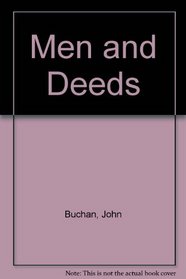Search -
Men and Deeds
Men and Deeds
Author:
MEN AND DEEDS BY JOHN BUCHAN LONDON PETER DAVIES PREFACE OF the papers in this collection, the first was the Rede Lecture at Cambridge in the autumn of 1929. The second appeared as a volume in Mr. Peter Davies Series of Short Biographies, the third and fourth as volumes in the same publishers Series of Great Occasions. The fifth was the Walker L... more »
Author:
MEN AND DEEDS BY JOHN BUCHAN LONDON PETER DAVIES PREFACE OF the papers in this collection, the first was the Rede Lecture at Cambridge in the autumn of 1929. The second appeared as a volume in Mr. Peter Davies Series of Short Biographies, the third and fourth as volumes in the same publishers Series of Great Occasions. The fifth was the Walker L... more »
ISBN-13: 9780836900651
ISBN-10: 0836900650
Edition: Facsimile
Rating: ?
ISBN-10: 0836900650
Edition: Facsimile
Rating: ?
0 stars, based on 0 rating
Publisher: Books for Libraries
Book Type: Hardcover
Other Versions: Paperback
Members Wishing: 0
Reviews: Amazon | Write a Review
Book Type: Hardcover
Other Versions: Paperback
Members Wishing: 0
Reviews: Amazon | Write a Review
Genres:




